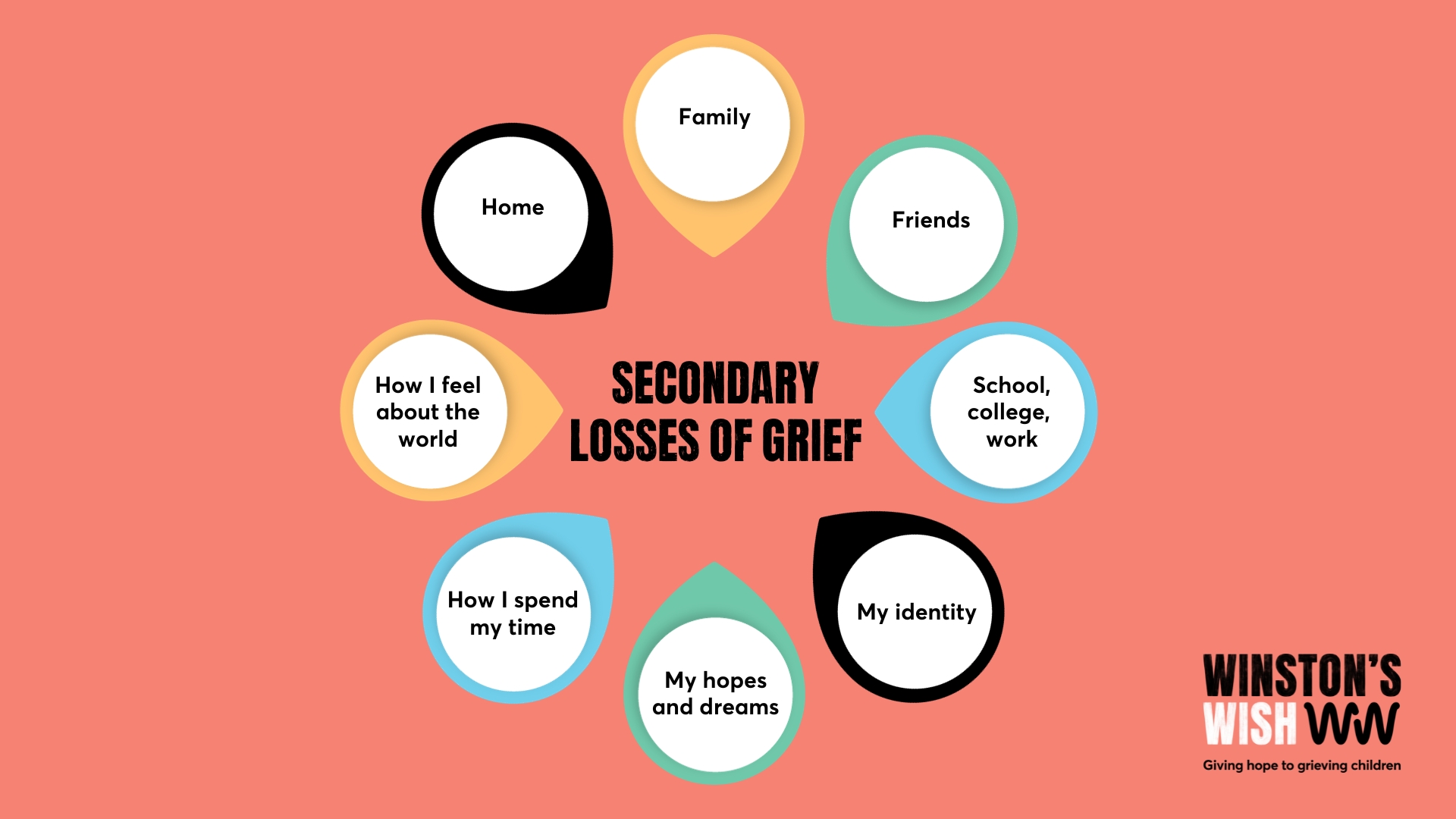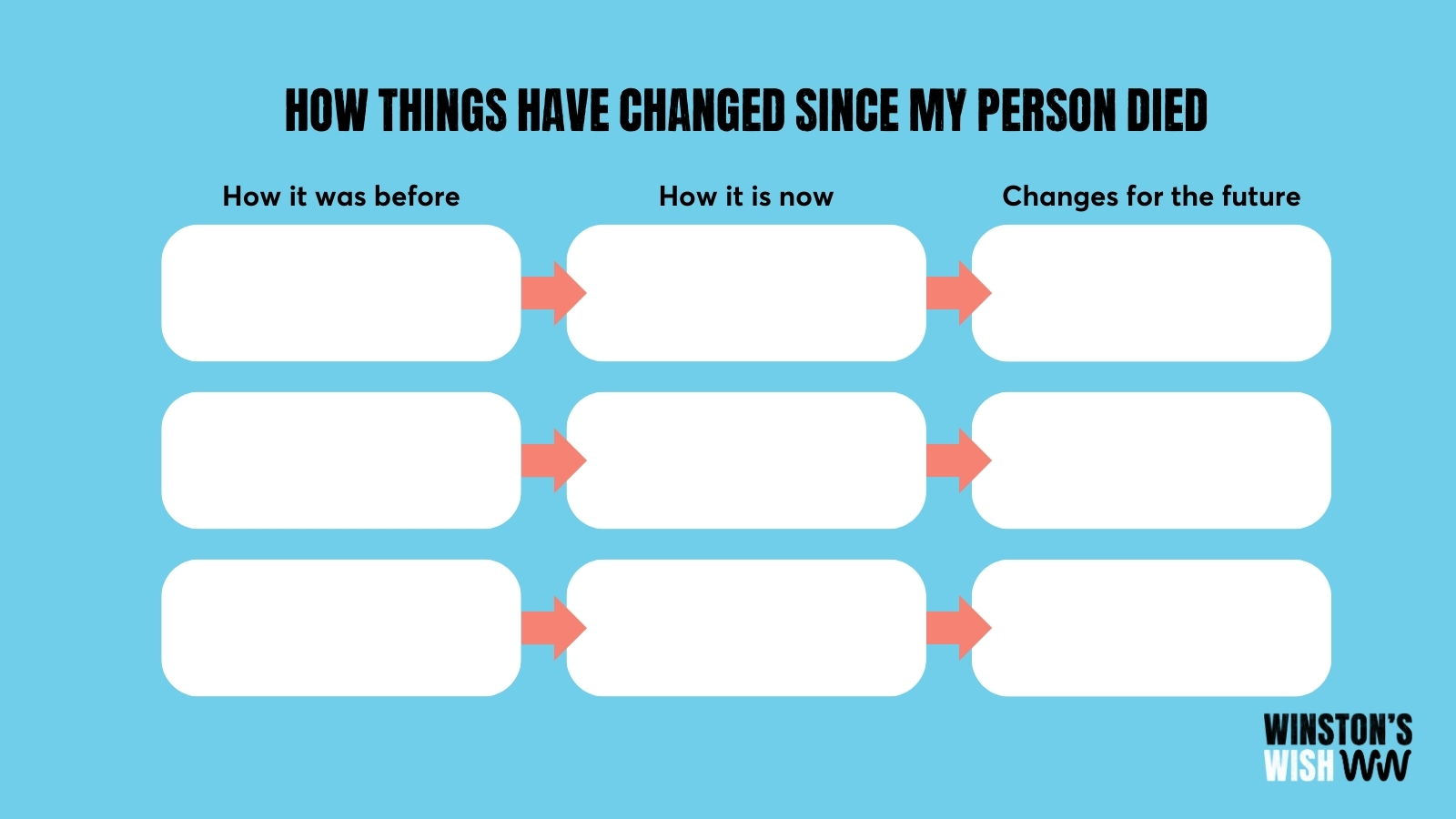Amy: When you think of Christmas, what do you think of?
Amy, Youth Ambassador, shares her personal experience of feeling alone at Christmas as well as some advice for other young grieving people.
The death of someone is mostly considered the primary loss, but it’s not the only loss you might experience when someone dies. Secondary losses include all the other factors and effects that death has had on your life; they are a completely normal part of grief and it’s important to recognise them to be able to start grieving them too.
Sometimes, to start a discussion about secondary losses, the Winston's Wish Support Team would use the example of a broken arm instead of a bereavement. That might sound odd, but it could help you to understand the idea of these losses in a clearer way. If you broke your arm, the main issue is that you’re in pain and have to wear a cast, but there may be secondary issues that also affect your situation. For example: it might feel more difficult to write; you may not be able to join in with sports; you might have trouble sleeping comfortably. These issues may cause lots of different emotions like feeling worried, frustrated, or envious.
Identifying secondary losses

Secondary losses might include lots of different parts of your life, for example: school, college, work, home, family, friends; your identity; how you spend your time; your hopes and dreams; how you feel about the world. All these things can be affected by grief. However, these secondary losses may occur at different times in your life and sometimes they might not impact you at all, but that doesn’t mean your grief is any less valid.
“One example of a secondary loss I experienced is that my dad used to take me to dance class every Saturday. He would drop me off and pick me up and now that he's gone, he can't take me anymore. I had quit dance classes before he died, but I will always remember our conversations in the car and how at the end of my dance lesson he used to watch me for a bit. Unfortunately, I never joined another dance class, but I still dance in my room to songs that remind me of him. I always thought of us having a good dance at my wedding someday and I will forever be sad about that. I like to think that on my actual wedding day he will still be dancing along, just not beside me.”
Grieving for secondary losses
Think about these different aspects of your life and if any have been affected by your grief at this moment in time. For example, if your parent used to take you to a swimming club every week, after they died there may not be anyone to take you and you might not be able to go anymore. If swimming was a big part of your life, this might feel like a further loss that has a real impact and adds to your grief. Or perhaps you had to move house, or schools, and in turn stopped being able to spend time with all your close friends. Identifying these losses can help to untangle the somewhat messy and confusing metaphorical ball of grief and organise your grief-y brain. By recognising secondary losses, you can find space and time to grieve for them. So, if you had to stop being part of your swimming club, that’s a significant loss and it’s okay to feel sad, angry, or any other emotion as a result.
Adapting to secondary losses
Let’s just quickly refer to the broken arm analogy from the start of this page. There are other issues that come about with having a broken arm and you would need to find ways to adapt and accept these issues. For example, it might feel difficult to write with a broken arm so maybe you are receiving help from a teaching assistant who you quite like spending time with, and it’s felt okay to adapt to this issue. Or maybe you can’t join in with sports with a broken arm, but this encouraged you to start a new hobby of singing in a choir, which you really enjoy!
With grief, there may be ways you can adapt and start to accept your secondary losses. If your parent used to take you to swimming, perhaps you could speak to the club and see if there’s anyone that lives locally that could take you, or you could try to find out if there’s another club you could join, or maybe you could speak to friends from your old swim club about other ways to spend time together. Sometimes there isn’t a way to fill the gap of a loss, and in these cases, acknowledging that you might need some help in finding ways to accept and adapt to your secondary losses is really important too. Speaking to someone about how you’re feeling and letting them help and understand you can make a big difference to the ways you can adjust to these losses.
If it helps to write things down, you could use the table below to write down your secondary losses and work towards identifying what they are, grieving for them, and adapting to how things are now.

“Personally, what helps me when I am struggling with my grief is watching videos of my dad or listening to music he liked. His music used to echo through the house, listening to it now brings me back to that feeling of safety and comfort that I had when he was here. It reminds me of how lucky I was to have him as my dad and how I carry him with me every day through my memories and interests.”
If you’re trying to manage your secondary losses or want to speak about anything related to your grief, we’re here to listen. Talk Grief is powered by Winston’s Wish, a youth grief charity that supports grieving children and young people. If you want to talk to someone about your grief, call us on 08088 020 021 (open 8am-8pm, weekdays), email ask@winstonswish.org or use our online chat (open 3-8pm, weekdays). If you need urgent support in a crisis, you can contact the 24/7 Winston’s Wish Crisis Messenger by texting WW to 85258.


Amy, Youth Ambassador, shares her personal experience of feeling alone at Christmas as well as some advice for other young grieving people.

Discover ways our Youth Ambassadors manage their feelings at Christmas time and into the New Year without their person.

Dom, Volunteer and former Youth Team member, shares a reflection on grief over time as a 27 year old.

How you can encourage your school, college or university to adopt a radical new way of supporting bereaved students.

Between a wedding and a grave: bearing witness in a broken world. What a childhood visit to Pakistan taught me about grief, hope, and the stories we still need to tell.

Youth Ambassador Jasmin shares her experience of sibling loss and ways she copes with grieving for her brother.

Youth Ambassador Ben shares his reflection on being a son when you are bereaved of a parent.

Grieving for someone you have no memories of can feel complicated. Discover ways to express your grief from our Bereavement Specialists.

Our bereavement support team share ways to cope when feelings about your grief come up unexpectedly.

Feeling angry when you're grieving is completely normal, but it's important to find healthy ways to cope with your feelings. Hear from our Youth Ambassadors.

Whether your bereavement happened recently or a long time ago, grief can re-surface when starting a new venture in your life, such as starting a new job. Here are some things to consider if you’re grieving and entering the world of work.

Grief can sometimes feel difficult to talk about, making it hard to make sense of your feelings. Poetry can offer a way to explore those emotions.

When a student dies from your school, it can bring up lots of big feelings, not just for the students who were close to them but also for those who did not know them.

Grief might make special days feel different for you, but does that mean you should not celebrate?

Ways to cope with your grief this summer when you have a lack of routine.

When someone important to you has died, it can be very overwhelming to think about where to start. Who do you need to inform? How do you do it? Where do you get help and advice?

Support, guidance, and ways to manage your grief after the death of your baby or child. This is written specifically for young parents aged 25 or under.

Some tips for taking care of yourself when you're grieving for a celebrity or public figure.

How MrBeast's YouTube video* was about more than just losing 110lbs and what we've taken from it. Written by a Winston’s Wish Bereavement Support Worker.

Understanding your feelings after the death of someone important to you who didn't know or support your authentic identity.

Advice from our bereavement support team about navigating grief with a learning disability.



Four young people from the Winston’s Wish Youth Team have shared their memories of their dads and their tips for others coping with Father’s Day while grieving for their dads.

Ashleigh, Youth Ambassador, shares how she feels about her first Father's Day without her dad and includes some tips for other young bereaved people.

Grief is a really common theme in TV, film, books, and more, so why is it such a taboo subject for some people to talk about?

It can be really hard knowing how to support your partner when they are grieving for someone important who has died. It's completely okay to be unsure of what to say or do. Here are some suggestions of ways you can try to help.

Whilst it never goes away, grief does start to feel different over time. But what can that look or feel like?

One thing we all have in common is life and death. There are lots of different traditions to mark the occasion of a person dying.

Hear from Natasha, Youth Ambassador, about how reading helps her process her bereavement.

Bereavement support tips for those who identify as part of the LGBTQ+ community. Tap the live chat button or scroll down to find ways to contact Winston's Wish for further support.

Discover ways to store memories of your parents and express how you're feeling in your grief.

Find ways to cope with grief and its emotions as a teen or young adult without their parents.

Winston's Wish Bereavement Support Workers share top tips for looking after your mental health when you're grieving.

Feeling confused by your grief? You're not alone. Our Bereavement Support Team share some reasons why it can be confusing.

Over winter, with the darker evenings, feelings of loneliness can seem more overwhelming than ever.

Iman, Youth Ambassador, shares how she grieves at Christmas even though she doesn't celebrate the occasion.

Crying is a normal response when your person has died, no matter how long ago. There's no right or wrong way to grieve, and it's okay to let it out.

A guide for grieving young people from the Winston's Wish Bereavement Support Team.

Three of our Youth Ambassadors, Anna, Libby and Angharad, reflect on their first Christmas without their person.

Winter and the Christmas holidays can be a difficult time of year. Here are five ways to remember your person this season.

Winston's Wish Bereavement Support Workers share their 8 top tips for bereaved teens and young adults through the colder months.

Youth Ambassadors share the ways they remember their person digitally, through photo albums, playlists, and more.

Youth Ambassadors, Daisy, Freya, and Katie, share their personal views of their own secondary losses as a result of their bereavement.

Hear from some of the Youth Team about times when their teachers have helped them with their grief.

Our Bereavement Support Team have written some guidance on how to manage grief when you feel like you aren't able to be open.

Lilly shares an introduction to her grief experience and why it's so important to her to be a Winston's Wish Youth Ambassador.

Hear from some of their Youth Team about how they found support at uni.

Angus, Content Creator, says, "This message is about embracing change and not letting current moments pass you by."

Coping strategies to support you after a teacher has died

Tips from our bereavement support team to help you with big life changes like moving out as a young adult.

Useful tips to help you understand and cope with your grief.

Feeling sad that your person isn't there, guilty that you're celebrating your results, or proud of yourself for your results. There's no right or wrong way to grieve.

It can be very difficult knowing what to say and to be around someone who has experienced the death of someone close. Adults find it difficult too, so try not to feel bad about this.

The death of a friend may feel extremely difficult and can feel as significant as that of a family member. Whatever you're feeling is valid, and there is no right or wrong way to grieve.


Jack, Content Creator, writes about how managing his grief through running has led to him winning the Leeds Half Marathon 2024!

Iman, Youth Ambassador, explains about Eid and shares what it's like for her and her family to grieve during Eid.

Miranda shares about how she uses music in different ways to help express her grief and emotions.

Ashleigh writes about how both writing and music have helped her in her grief.

The Winston's Wish bereavement support team share top tips for managing grief this Father's Day.

Grace's dad died from cancer when she was eight years old, she shares how she remembers her dad on Father’s Day.


Feelings of worry are very normal when you're grieving. Read on to discover some ways to manage these feelings.

Useful tips for exam season if you're grieving

Youth Ambassador, Iman, shares about her Eid celebrations as a grieving young person

Content Creator, Angus shares his thoughts

Useful tips for exam season

Interview with Mark O’Sullivan, writer of Tell Me Everything

Tips to help improve your sleep when you're grieving

How poetry can be a useful way to express your feelings

Young people share what it's like to grieve while studying at uni.

Our bereavement experts are available to speak to for immediate support on weekdays from 8am to 8pm.

Get top tips from bereavement experts, and hear from Youth Ambassadors, Henri and Teigan, about their experiences of Mother's Day.

Phoebe's mum died when she was nine. She shares how she feels on Mother’s Day and how she remembers her mum.


































